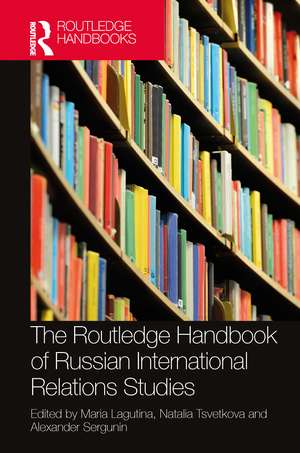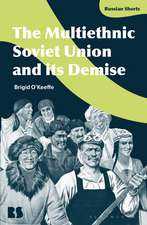The Routledge Handbook of Russian International Relations Studies
Editat de Maria Lagutina, Natalia Tsvetkova, Alexander Serguninen Limba Engleză Paperback – 29 noi 2024
| Toate formatele și edițiile | Preț | Express |
|---|---|---|
| Paperback (1) | 422.86 lei 6-8 săpt. | |
| Taylor & Francis – 29 noi 2024 | 422.86 lei 6-8 săpt. | |
| Hardback (1) | 1402.57 lei 6-8 săpt. | |
| Taylor & Francis – 27 feb 2023 | 1402.57 lei 6-8 săpt. |
Preț: 422.86 lei
Nou
Puncte Express: 634
Preț estimativ în valută:
80.92€ • 87.87$ • 67.98£
80.92€ • 87.87$ • 67.98£
Carte tipărită la comandă
Livrare economică 23 aprilie-07 mai
Preluare comenzi: 021 569.72.76
Specificații
ISBN-13: 9781032189963
ISBN-10: 1032189967
Pagini: 462
Dimensiuni: 174 x 246 x 28 mm
Greutate: 0.45 kg
Ediția:1
Editura: Taylor & Francis
Colecția Routledge
Locul publicării:Oxford, United Kingdom
ISBN-10: 1032189967
Pagini: 462
Dimensiuni: 174 x 246 x 28 mm
Greutate: 0.45 kg
Ediția:1
Editura: Taylor & Francis
Colecția Routledge
Locul publicării:Oxford, United Kingdom
Public țintă
Academic, Postgraduate, and Undergraduate AdvancedCuprins
Introduction Part One. Basics of Russian International Studies 1. History of International Studies in Russia: from Ideology to Theory 2. Three Intellectual Traditions in Russian International Studies: Westernism, Statism and Eurasianism 3. Mapping Russian IR Schools: The Post-Soviet Era Part Two. Russia’s International Relations Paradigms 4. Philosophy of International Relations 5. Russian Geopolitics: from Geographic Determinism to Critical Geopolitics 6. Russian Сivilization Approaches to International Relations 7. Russian ‘Classic’ IR Theories 8. Regional Studies in Russia Part Three. Area Studies in Russia 9. European Studies in Russia 10. American Studies in Russia 11. Asia-Pacific Studies in Russia 12. Studies on Middle East in Russia 13. Latin American Studies in Russia 14. Arctic Studies in Russia 15. Eurasian Studies in Russia Part Four. Russia's International Research Agenda 16. Russia’s Vision of a New World Order: from Multipolarity to Polycentricity 17. Russia’s Turn to the East? 18. International Political Economy: Russian School 19. From Stalin to Putin: Indivisibility of Peace and Security in Russian IR Scholarship and in Foreign Policy 20. Conflict Studies in Russia: A Thorny Path through Ethnic Conflictology towards Integration with the Global Scholarship 21. Russia’s Policy Towards the Unrecognized / Partially Recognized Post-Soviet States 22. Russian Diplomacy Studies: State of Art 23. Dealing with Difference: Studies on Soft Power in Russian and Global International Relations 24. Digital International Relations: Uncertainty, Fragmentation, and Political Framing 25. Russia’s Sports Diplomacy 26. Russia’s Climate Neutrality? 27. The Russian Orthodox Church and the World: Mapping the Theme for IR Studies 28. Studies of the Role of Non-governmental Organizations in International Relations: Unity of Theory and Selectivity of Practice In lieu of Conclusion: towards a Global IR research agenda?
Notă biografică
Maria Lagutina is professor of world politics department at St. Petersburg State University. She is a doctor of political sciences. Professor Lagutina’s current research interests are oriented towards Eurasian integration and its regional and global dimensions, BRICS, global governance, regional integration, comparative regionalism, and international cooperation in the Arctic. Among her publications: The Russian Project of Eurasian Integration: Geopolitical Prospects (Lexington 2016; co-authored with N. Vasilyeva); Russia’s Arctic Policy in the Twenty-first Century: National and International Dimensions (Lexington 2019).
Alexander Sergunin is a professor of international relations at St. Petersburg State University and a professor of political science at the Nizhny Novgorod University (part time). A specialist in Russian foreign policy thinking and making, his relevant publications include Explaining Russian Foreign Policy: Theory and Practice (2016).
Natalia Tsvetkova is a professor of history and head of the American studies department at St. Petersburg State University, Russia. She writes about the cultural Cold War, cultural diplomacy, and extensively about current public and digital diplomacy. Among her publications: Cold War in Universities: U.S. and Soviet Cultural Diplomacy, 1945–1990 (Brill, 2021) and Russia and the World: Understanding International Relations (Lexington 2017, 2020).
Alexander Sergunin is a professor of international relations at St. Petersburg State University and a professor of political science at the Nizhny Novgorod University (part time). A specialist in Russian foreign policy thinking and making, his relevant publications include Explaining Russian Foreign Policy: Theory and Practice (2016).
Natalia Tsvetkova is a professor of history and head of the American studies department at St. Petersburg State University, Russia. She writes about the cultural Cold War, cultural diplomacy, and extensively about current public and digital diplomacy. Among her publications: Cold War in Universities: U.S. and Soviet Cultural Diplomacy, 1945–1990 (Brill, 2021) and Russia and the World: Understanding International Relations (Lexington 2017, 2020).
Descriere
This handbook examines the study of International Relations (IR) in Russia, giving a comprehensive analysis of historical, theoretic-conceptual, geographical, and institutional aspects.


